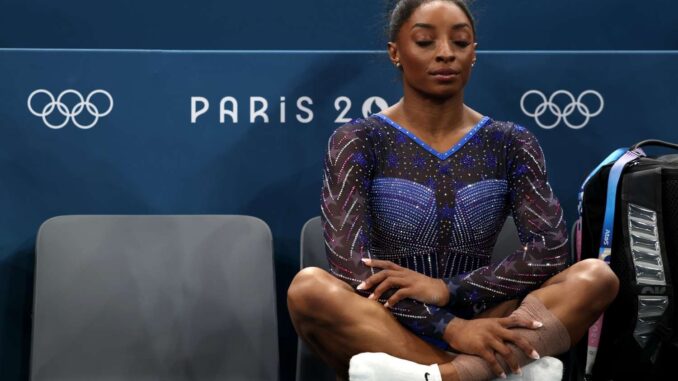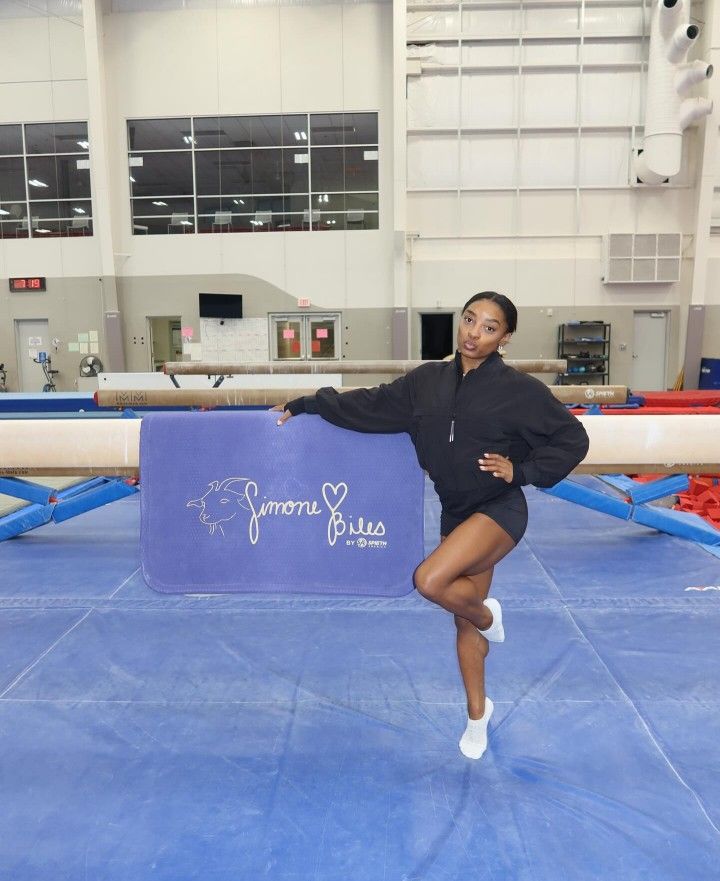
Conservative sports activist Riley Gaines used Olympian Simone Biles’ own words against her Sunday as their feud over transgender athletes reached a fevered pitch. Gaines — a former University of Kentucky swimmer vehemently opposed to trans participation in women’s sports — unearthed a nearly decade-old tweet that the gymnastics icon posted in which she appeared to agree with Gaines’ stance. “ahhhh good thing guys don’t compete against girls or he’d take all the gold medals !!” Biles wrote in the 2017 tweet, apparently responding to the men’s division results at the World Artistic Gymnastics Championships in Canada.
Gaines — who Biles referred to as a “sick bully” for her anti-trans stance Friday — let the Olympian have it. “Oop don’t you hate it when your past self completely undermines your current nonsensical argument?” she wrote while retweeting Biles’ post.
In 2017, Olympic gymnast Simone Biles tweeted, “Ahhhh good thing guys don’t compete against girls or he’d take all the gold medals!!” This lighthearted remark, made after the 2017 World Artistic Gymnastics Championships, resurfaced recently, reigniting a fiery debate between Biles and former collegiate swimmer Riley Gaines. The controversy centers on the inclusion of transgender athletes in women’s sports and has intensified the ongoing national conversation about fairness and inclusivity.
The Resurfacing of Biles’ 2017 Tweet
Biles’ 2017 tweet was a playful comment on the dominance of male gymnasts. However, in the current climate of heightened sensitivity around gender and sports, the tweet has been interpreted by some as contradictory to her recent advocacy for transgender inclusion. The resurfacing of this tweet has added fuel to the fire in her feud with Riley Gaines.
Riley Gaines: A Vocal Critic of Transgender Inclusion
Riley Gaines gained national attention in 2022 when she tied with transgender swimmer Lia Thomas at the NCAA championships. Since then, Gaines has become a prominent critic of transgender women competing in women’s sports. She argues that such participation undermines the integrity of female athletics and has called for policies to restrict transgender inclusion.
Biles’ Advocacy for Transgender Inclusion
In contrast, Simone Biles has been an outspoken advocate for transgender athletes’ rights to compete in women’s sports. She has criticized policies that exclude transgender individuals and has suggested the creation of separate categories for transgender athletes to ensure fairness and inclusivity.
The Feud Intensifies
The conflict between Biles and Gaines escalated when Biles referred to Gaines as a “sore loser” and a “sick bully” on social media. Biles condemned Gaines’ attacks on transgender athletes, labeling them as harmful and divisive. In response, Gaines accused Biles of hypocrisy, citing her 2017 tweet to question her current stance on transgender inclusion.
Public Reactions and Backlash
The feud has sparked widespread public debate. Supporters of Biles praise her for standing up for marginalized athletes and promoting inclusivity. Conversely, Gaines’ supporters argue that her concerns about fairness in women’s sports are valid and that Biles’ position undermines the protection of female athletes.
The Role of Social Media in Modern Debates
This dispute highlights the significant role social media plays in shaping public discourse. Platforms like Twitter and Instagram have become battlegrounds for ideological conflicts, allowing athletes to directly engage with their audiences and influence public opinion.
The Impact on Women’s Sports
The Biles-Gaines feud underscores the broader challenges facing women’s sports today. The inclusion of transgender athletes raises questions about fairness, safety, and the definition of womanhood in competitive athletics. These debates are not just theoretical; they have real-world implications for policies, sponsorships, and the experiences of athletes at all levels.
Looking Ahead: Possible Resolutions
To address these complex issues, experts suggest exploring solutions such as creating separate categories for transgender athletes or implementing more nuanced eligibility criteria. The goal would be to balance inclusivity with fairness, ensuring that all athletes have the opportunity to compete on a level playing field.

Conclusion: A Divisive Debate with No Easy Answers
The resurfacing of Simone Biles’ 2017 tweet has reignited a passionate debate between her and Riley Gaines over the inclusion of transgender athletes in women’s sports. While Biles advocates for inclusivity, Gaines emphasizes the need to protect the integrity of female athletics. This ongoing feud reflects the broader societal tensions surrounding gender identity and fairness in sports.
FAQs
1. What was Simone Biles’ 2017 tweet about?
Simone Biles’ 2017 tweet was a playful comment suggesting that if men competed against women in gymnastics, they would dominate the sport.
2. Why did Riley Gaines criticize Simone Biles?
Riley Gaines criticized Simone Biles for her support of transgender athletes in women’s sports, arguing that it undermines the fairness of female athletics.
3. How did Simone Biles respond to Riley Gaines?
Simone Biles called Riley Gaines a “sore loser” and a “sick bully” for her attacks on transgender athletes, condemning her stance as harmful and divisive.
4. What is the main issue in the Biles-Gaines feud?
The main issue is the inclusion of transgender athletes in women’s sports and the debate over fairness versus inclusivity.
5. What are potential solutions to this debate?
Potential solutions include creating separate categories for transgender athletes or implementing more nuanced eligibility criteria to balance inclusivity with fairness.